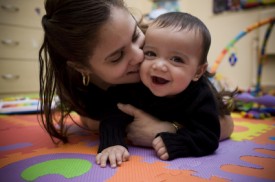
Over the years, many people have speculated about the advantages and disadvantages of exposing an infant to a second language. On one hand, it sounds great to think that children could be proficient in two languages by the time they go to school but, on the other hand, there is the concern that adding a second language could cause confusion and even delay language development in very young children.
Fortunately, Janet Werker, a psychologist at Vancouver's University of British Columbia, and her colleagues discovered that learning two languages simultaneously does notcause confusion and, in fact, can give young children cognitive advantages over their monolingual peers. It now appears that bilingual children develop enhanced visual sensitivity to language as well as the auditory sensitivity that we would expect.
Most people in other countries speak multiple languages and researchers have not found real evidence of language confusion in children who learn more than one language at a time. Of course, infants and toddlers who grow up in bilingual homes often will mix the two languages and that ‘mixing’ even has a name: code-switching. By the time these babies are three years of age, they will move back and forth between the languages but they also naturally learn to follow rules that govern that movement. For example, if one parent is not bilingual, they stick to the dominant language for that parent but will code-switch with the bilingual parent.
The study [i]also tested visual-language discrimination with four, six and eight month-olds and found that at the two earlier ages, infants can distinguish between two spoken languages when looking at a video of a person speaking with the sound muted, even if they are only familiar with one of the languages. By eight months of age, the babies’ brains can even discriminate between two unfamiliar languages simply by watching someone speak. Further studies will determine how long this ability is maintained in childhood but it does appear that there is a lasting influence from early exposure to additional languages.
Research also indicates that babies growing up in a bilingual environment are better able to attend to perceptual cues such as a change in voice tone or facial expression, in both languages and can apply this ability to distinguish things in the world as well. Additional research [ii]suggests that bilingual children also could have more flexibility in learning.
So, if you speak two languages fluently, share them with your babies from day one. Expanding infancy with a second language could provide stronger cognitive skills, more perceptive social skills and better learning in general. Don’t worry about videos, flash cards or other fancy options for teaching babies a second language - just talk and read together!
Related Reading:
What Every Parent Should Know About Their Baby’s Developing Brain (Part 1)
Engaging Children in the World with Words
[i]Moskowitz, Clara. What Bilingual Babies Reveal About the Brain: Q&A with Psychologist Janet Werker. March 01, 2011.
[ii]Hsu, Jeremy. Bilingual Babies Get an Early Edge. April 13, 2009.

